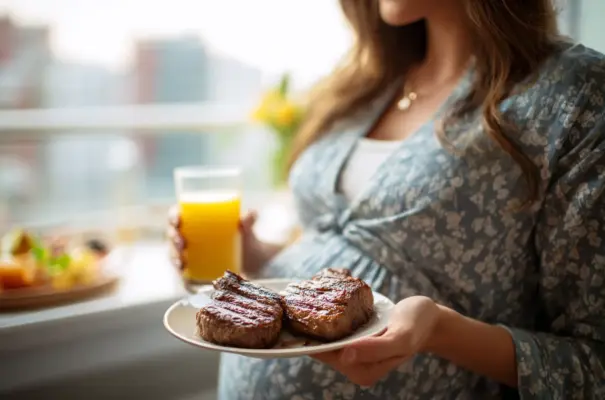At a time when plant-based diets are gaining visibility, a sensitive topic returns to the forefront of discussions: nutrition during pregnancy. According to the literature review “Carne Bem-Criada,” conducted by Adeca Agronegócios, a consulting group from the Luiz de Queiroz College of Agriculture (Esalq/USP) at the University of São Paulo, women who consume meat during pregnancy have a lower risk of serious complications, such as premature birth, low birth weight, and even neonatal mortality.
The document compiles data from various scientific publications, including Pili Kamenju’s study, conducted in Tanzania, which followed over seven thousand pregnant women. A higher frequency of animal protein consumption by pregnant women found a 30% lower risk of neonatal mortality. The study also observed a 28% lower risk of premature birth, a 36% lower chance of the baby being born with low birth weight, and a 41% lower probability of very premature birth (at less than 32 weeks).
Nutrition in critical life stages
According to a report by the United Nations Food and Agriculture Organization (FAO), published in 2023, terrestrial animal-source foods play a decisive role in human health and development, especially during periods of increased nutritional vulnerability, such as pregnancy, lactation, infancy, adolescence, and aging. Titled “Contribution of terrestrial animal-source foods to a healthy diet for improved nutrition and health,” the document highlights that meats, eggs, and dairy products offer high-biological-value proteins, in addition to nutrients such as essential fatty acids, iron, zinc, selenium, calcium, and vitamin B12, all relevant for fetal development and the pregnant woman’s health. Also according to the FAO, it is difficult to obtain these nutrients in sufficient quantity and quality exclusively through plant-based foods.
Pregnancy requires extra attention to diet
During pregnancy, nutritional balance is essential to ensure proper fetal development and the mother’s health. Diets that completely eliminate food groups, such as meat, can jeopardize the adequate supply of micronutrients. The FAO report indicates that nutritional deficiencies during this period increase the risk of problems such as restricted intrauterine growth, low birth weight and height, premature birth, and other complications that affect health throughout life.
Among the most critical nutrients is iron, whose deficiency is common during pregnancy and can lead to adverse effects for both the mother and the baby, including changes in neurodevelopment, cognition, and infant mental health, as indicated by the literature review “Carne Bem-Criada,” citing the study “Relationship Between Maternal Meat Consumption During Pregnancy and Umbilical Cord Ferritin Concentration” by Mario Moraes Castro and other researchers. Iron, as well as zinc, present in high bioavailability in meats, are especially important during pregnancy, a phase marked by a significant expansion of plasma volume.
Red meat, in particular, offers heme iron, which is more efficiently absorbed and essential for placenta formation and oxygen transport throughout the body. Therefore, ensuring access to nutrient-rich foods, in a safe and balanced way, remains one of the most effective strategies to promote maternal and child health. In this context, animal-source products play a significant role.




